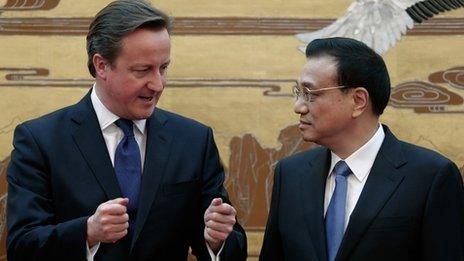China media: Cameron's visit
- Published

British PM David Cameron (left) held talks with China's Li Keqiang
British Prime Minister David Cameron's visit to China gets a mixed reception in the mainland and Hong Kong press.
The Beijing News, external welcomes Mr Cameron's visit as a sign that relations between the two countries are "heading gradually towards a normal track after experiencing twists and turns".
However, it expresses disappointment that he did not announce measures to ease visa applications for Chinese nationals.
"Mr Cameron's trip to Beijing could have won a good impression among more Chinese, but he did not announce policies on facilitating visas. This obviously shows the unease and cautious stance of the Conservatives on immigration," the paper says.
While highlighting the economic benefits of the visit, the China Daily, external calls for Britain to "respect core interests" of China and not offend Beijing on issues deemed politically sensitive.
The paper highlights that Mr Cameron has only just managed to mend severely strained ties after he angered Beijing by meeting the exiled Tibetan spiritual leader the Dalai Lama in May 2012.
Hong Kong's South China Morning Post, external notes that Mr Cameron left "contentious human rights issues on the sidelines" when overseeing the signing of business deals with Chinese Premier Li Keqiang on Monday.
'Displeasure'
Meanwhile, nationalist daily Global Times, external has shown strong displeasure at UK diplomacy over Hong Kong's political reform and Beijing's ongoing air defence zone row with Japan.
The newspaper first questions Mr Cameron's "sincerity" on improving ties with China after the British Royal Navy's Chief of Staff, Admiral George Zambellas met Japanese Defence Minister Itsunori Onodera and "supported Japan's stance" toward China's controversial Air Defence Identification Zone in the East China Sea.
It then attacks the British government for "carping comments" on Hong Kong's political reform.
The Wen Wei Po, external, a Beijing-backed Hong Kong newspaper, recalls that UK Minister of State for Foreign and Commonwealth Affairs Hugo Swire made "irresponsible remarks, external" after he called for the people of Hong Kong to have a genuine choice in electing their city's leader in 2017.
"The UK is highly 'replaceable' in China's Europe diplomacy. The UK is no longer any so-called 'big country', and it is an old European country suitable for travel and study abroad, with a few good football teams. This thinking used to make the Chinese angry, but slowly many people are becoming used to this thinking towards the UK," says the Global Times.
In another high-profile visit to China, mainland analysts are expecting Beijing's controversial new Air Defence Identification Zone over the East China Sea to top the agenda of US Vice-President Joe Biden's upcoming talks with Chinese leaders.
He arrives in Beijing on Wednesday on the second leg of an East Asia visit, which will take him to Japan, China and South Korea.
The Global Times, external also has sharp words of advice for Mr Biden not to show support for Japan over the air defence zone row.
"The US stance of feigning fairness while actually backing one side between China and Japan seems established, but if Biden's tricks in Japan go too far, this will seriously affect the atmosphere of his next visit to China," it warns.
In other news, Hong Kong is stepping up contingency measures after reporting its first case of the deadly H7N9 bird flu virus, reports the Ming Pao, external.
An Indonesian domestic worker is in a critical condition, after travelling to neighbouring Shenzhen where she had killed and cooked a live chicken, health authorities say. Health officials are looking for a second person who accompanied the helper to Shenzhen on 17 November,
The Oriental Morning Post, external complains about smog in Shanghai hitting its worst level of 303 on the official Air Quality Index (AQI) on Monday morning.
Crossing the 300 threshold indicates the worst level of air pollution on the chart.
BBC Monitoring, external reports and analyses news from TV, radio, web and print media around the world. For more reports from BBC Monitoring, click here. You can follow BBC Monitoring on Twitter , externaland Facebook, external.